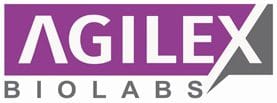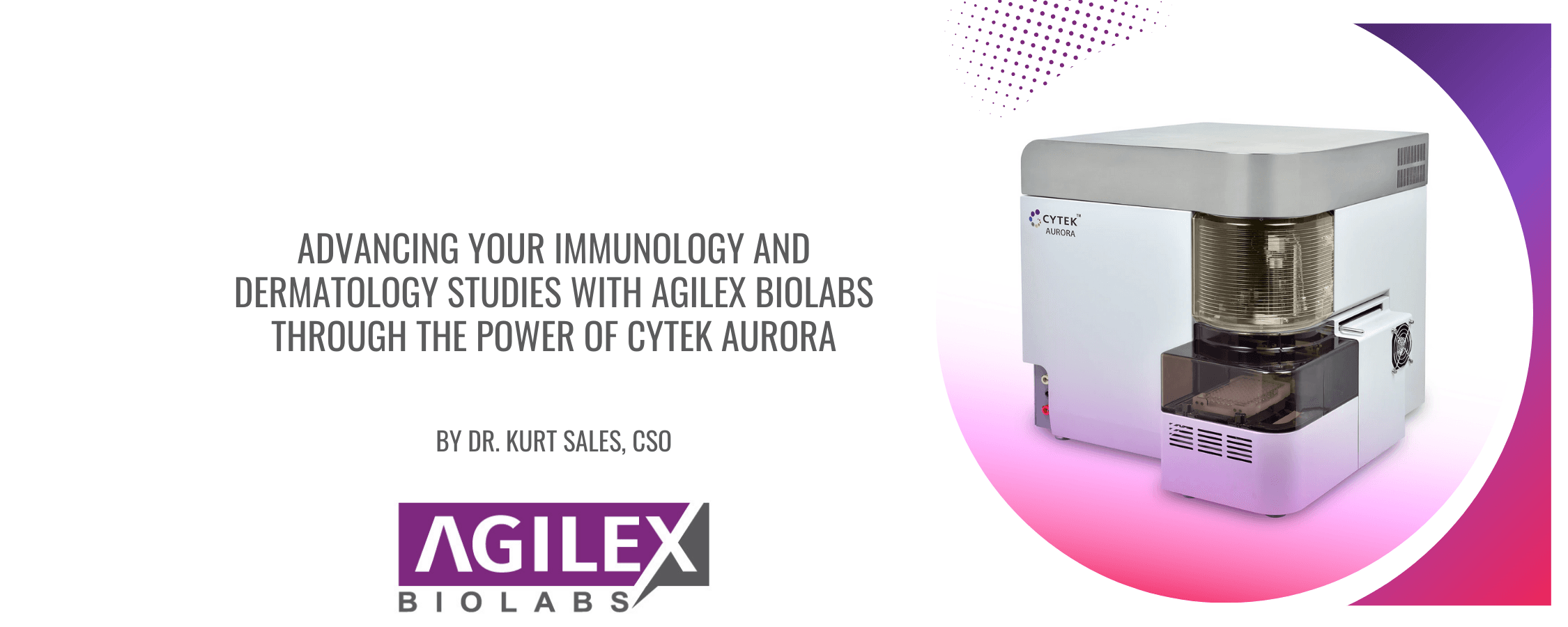By Dr. Kurt Sales, CSO
Summary
The following article focuses on the use of flow cytometry in clinical trials and the use of Agilex Biolab’s new Cytek Aurora spectral flow cytometry platform. The Cytek Aurora platform represents a significant advance over traditional flow cytometry methods, overcoming many of the known shortcomings.
Here, we assess its conventional role in immune cell profiling, vaccine efficacy and autoimmune disease research, and more recently in clinical trials for dermatological research.
The revolutionary advances inherent in spectral flow cytometry has significant implications for researchers and organizations involved in immunology trials, dermatology trials and inflammation trials in Australia. From a performance perspective, the Cytek Aurora’s spectral flow cytometry technology is superior, more capable, faster and more cost effective than some traditional platforms available in Australia.
Clinical trials are the cornerstone of medical advancements, providing life-saving new treatments and critical insights into disease mechanisms, treatment efficacy, and patient outcomes. Among the many technologies supporting these studies, flow cytometry stands out as a powerful tool for analyzing cellular characteristics at a single-cell level. This technology has become indispensable in immunology and dermatology trials in Australia, enabling detailed receptor occupancy evaluation, immune profiling, and biomarker research.
The introduction of high-dimensional spectral flow cytometers, such as the Cytek Aurora, has further revolutionized clinical studies, proving unparalleled accuracy and depth of analysis. To this end, Agilex Biolabs has recently invested in the Cytek Aurora spectral flow cytometer at its new bioanalytical facility in Brisbane to complement its well-established flow cytometry services in Adelaide.
The following explores the role of flow cytometry in clinical trials and how Agilex can support applications in immunology and dermatology in Queensland and South Australia through the transformative impact of the Cytek Aurora system.
Understanding Flow Cytometry in Clinical Trials
Flow cytometry is a laser-based technology enabling rapid quantification and characterization of individual cells within heterogeneous populations. By labeling cells with fluorescent markers that bind to specific proteins, researchers can assess cell properties such as phenotype, function, and activation status.
In clinical trials, flow cytometry is crucial for:
- Immune monitoring: Assessing immune cell populations and their responses to treatments
- Biomarker evaluation: Identifying markers of therapeutic effects and disease progression
- Cell-based assays: Evaluating drug mechanisms of action, receptor occupancy, and therapeutic efficacy
By delivering fast, high-throughput quantitative data, flow cytometry supports early-phase decision-making and contributes to the successful translation of therapies into clinical practice.
Flow Cytometry for Immunology Clinical Trials
Immunology trials in Australia rely heavily on flow cytometry to dissect complex immune responses in both healthy and diseased states. Agilex Biolabs supports a range of customised flow cytometry panels across key applications:
1. Immune Cell Profiling with Flow Cytometry
Characterizing immune subsets such as T cells, B cells, NK cells, and dendritic cells is essential in studies involving immune-modulating therapies. Flow cytometry enables:
- Quantification of cell populations in peripheral blood and tissues.
- Identification of regulatory T cells (Tregs) and exhausted T cells in immunotherapy studies.
2. Using Flow Cytometry to Assess Vaccine Efficacy
Vaccine trials require accurate monitoring of immune responses. Flow cytometry allows researchers to:
- Measure antigen-specific T and B cell responses.
- Assess memory and effector cell populations.
- Evaluate cytokine production following vaccine administration.
3. Studying Autoimmune Diseases with Flow Cytometry
Autoimmune diseases like rheumatoid arthritis, lupus, and multiple sclerosis involve immune dysregulation. Flow cytometry supports:
- Identification of autoreactive lymphocytes.
- Analysis of inflammatory cytokine profiles.
- Monitoring of therapeutic effects on immune cell homeostasis.
Flow Cytometry for Dermatology Clinical Trials
Recent advancements in flow cytometry have significantly enhanced dermatology trials in Australia, particularly in inflammatory skin disease research and oncology, , supporting the development of targeted treatments. Key applications in dermatology clinical trials include:
1. Analyzing Inflammatory Skin Diseases with Flow Cytometry
Chronic skin conditions, such as psoriasis, atopic dermatitis, and hidradenitis suppurativa, involve complex immune interactions. Flow cytometry aids in:
- Identifying pathogenic T cell subsets, including Th1, Th2, Th17, and Th22
- Measuring cytokines and chemokines linked to skin inflammation
- Evaluating the effects of biologics targeting immune pathways
- Characterizing resident immune cells in healthy and diseased skin.
- Assessing immune cell infiltration following treatment.
- Evaluating the role of regulatory cells in maintaining skin homeostasis.
2. Flow Cytometry for Oncology and Skin Cancer Research
Melanoma and other skin cancers require precise immune profiling to develop effective immunotherapies. Agilex has extensive experience in oncology and immune-oncology studies. Flow cytometry is used to:
- Identify tumor-infiltrating lymphocytes (TILs)
- Analyse PD-1/PD-L1 expression in immunotherapy trials
- Detect circulating tumor cells (CTCs) for disease monitoring.
- Assess target engagement and receptor occupancy.
- Evaluate activation and proliferation status of specific immune cells.
The Cytek Aurora: Transforming Clinical Flow Cytometry
Traditional flow cytometry methods are limited in the number of parameters they can assess simultaneously due to spectral overlap and compensation issues. In a clinical trial setting for a first-in-class novel drug, data is everything! Which is why Agilex invested in the Cytek Aurora platform at its two Bioanalytical locations in Brisbane and Adelaide, co-located within Phase 1 units, to minimize sample transit time and maximise quality of the sample and data. The Cytek Aurora spectral flow cytometer has transformed clinical research, offering a new era of high-dimensional multi-parametric analysis. The benefit of this new technology and location in Adelade and Brisbane for sponsors includes rapid turnaround of sample analysis and acquisition of data in real time as the cytometers are co-located within the same building as the phase 1 units, minimizing risk and cost and maximizing sample integrity and data.
1. How Full-Spectrum Flow Cytometry Works with Cytek Aurora
Unlike conventional cytometers that rely on bandpass filters to capture fluorescence, the Cytek Aurora utilizes full-spectrum technology to detect the entire emission profile of each fluorochrome. This allows for:
- Improved resolution of rare cell populations.
- Enhanced detection of multiple markers in a single panel.
- Reduced compensation requirements, leading to more accurate results.
2. High-Parameter Analysis in Clinical Trials
The ability to analyze up to 40 colors simultaneously enables comprehensive immune profiling with minimal sample input. This is particularly beneficial in:
- Small-volume patient samples in clinical trials.
- Longitudinal studies tracking immune changes over time.
- Multiplexed assays that maximize data output from limited samples.
3. Improved Sensitivity and Standardisation with Cytek Aurora
Clinical trials demand reproducible and sensitive assays to ensure robust data generation. The Cytek Aurora offers:
- Enhanced sensitivity for detecting low-expressing markers.
- Improved standardization across multi-center studies.
- Greater flexibility in panel design, allowing customisation for specific research needs.
The Cytek Aurora enables:
- Enhanced sensitivity for detecting low-expressing markers.
- Improved standardisation across multi-centre studies
- Greater flexibility in panel design for specific research needs
The adoption of Cytek Aurora in immunology and dermatology trials is transforming how researchers approach immune profiling and therapeutic development. Its high-resolution, customisable analysis promotes accurate, efficient outcomes across diverse disease areas.
Conclusion: Why Flow Cytometry and Cytek Aurora Matter in Clinical Trials
Flow cytometry remains a cornerstone technology in clinical trials, especially in immunology and dermatology research. With the ability to analyse complex immune responses, track disease progression, and measure therapeutic outcomes, it plays a critical role in bioanalytical services in Australia.
The integration of the Cytek Aurora has revolutionized this field, offering high-parameter, cost-efficient, and fast solutions for trial sponsors. As technology evolves, flow cytometry will remain at the forefront in bioanalysis services in Australia, supporting both research and improved patient outcomes. To learn more about how Agilex Biolabs can support your next clinical trial, contact us today at BD@AgilexBiolabs.com for a confidential discussion.



